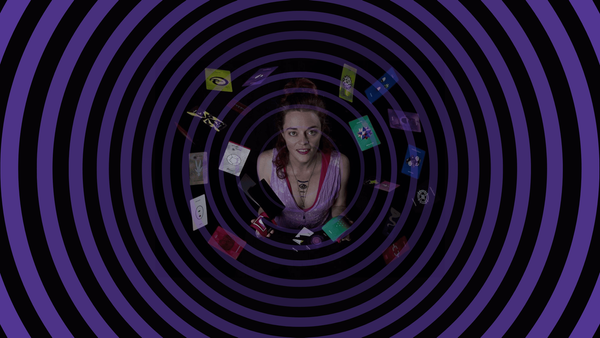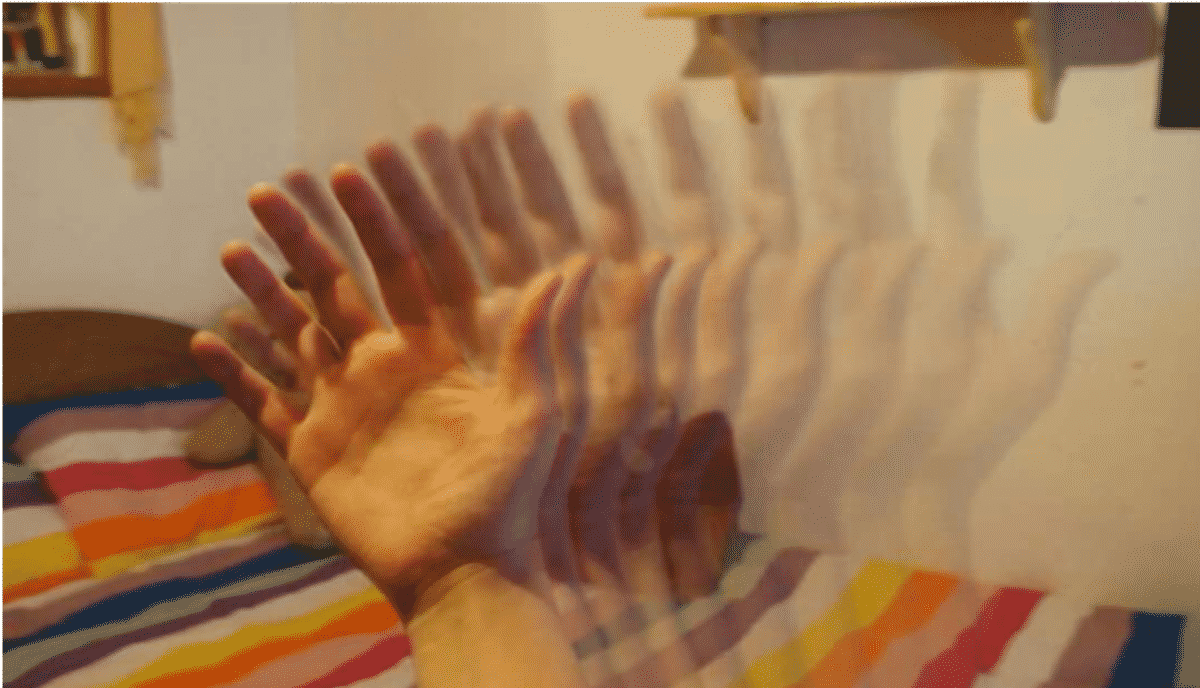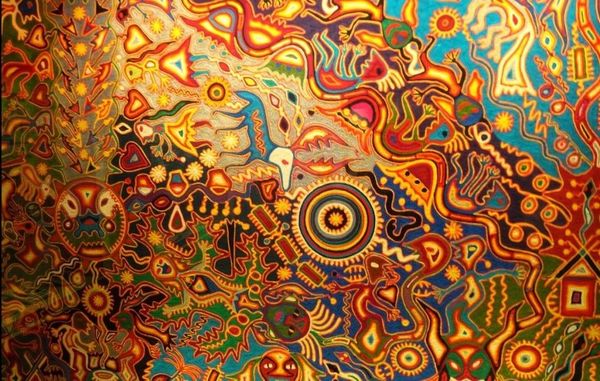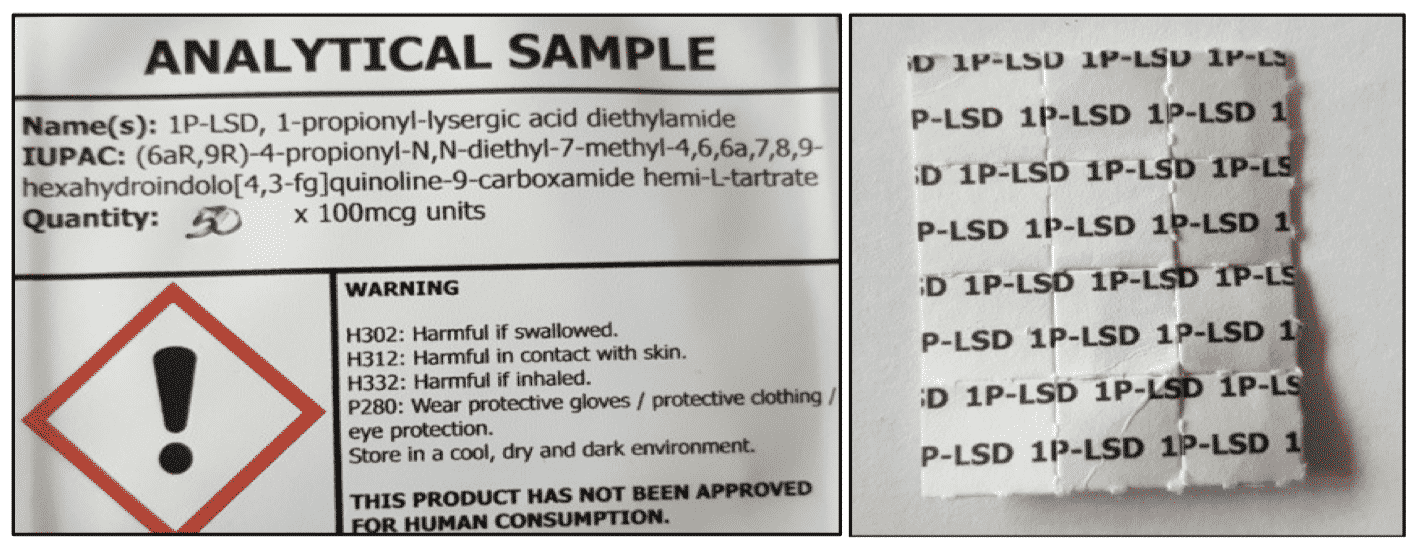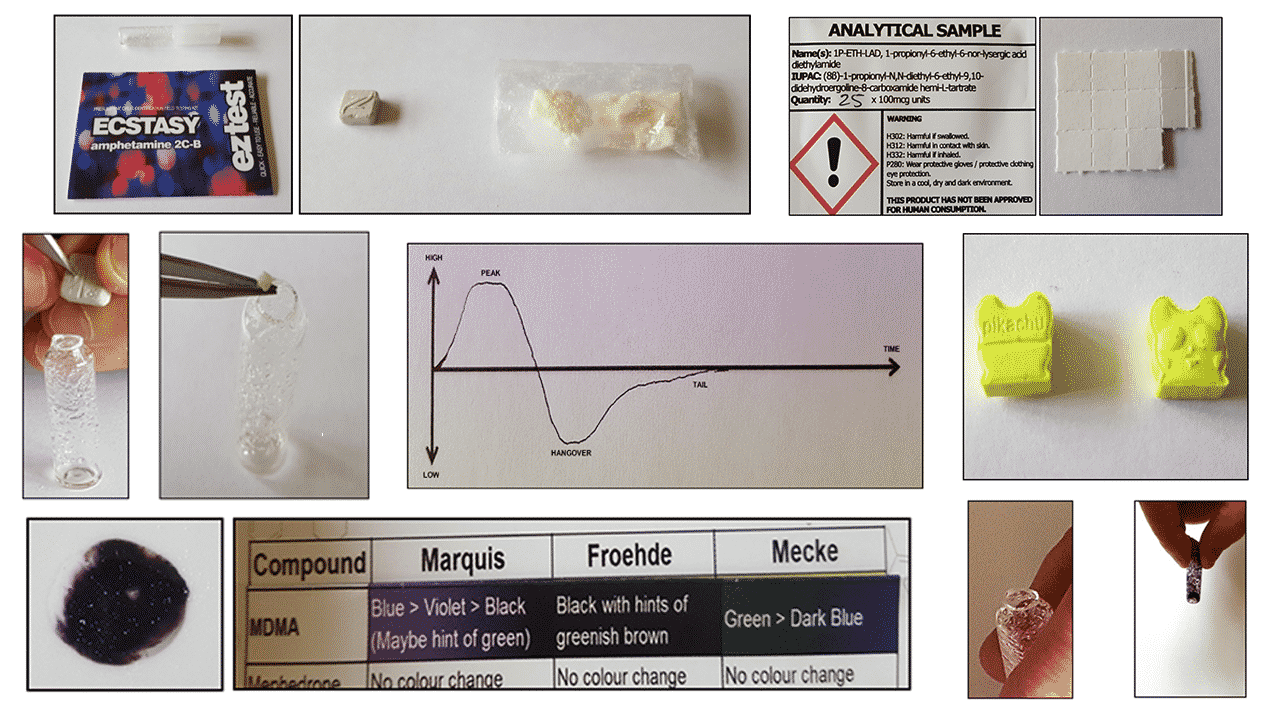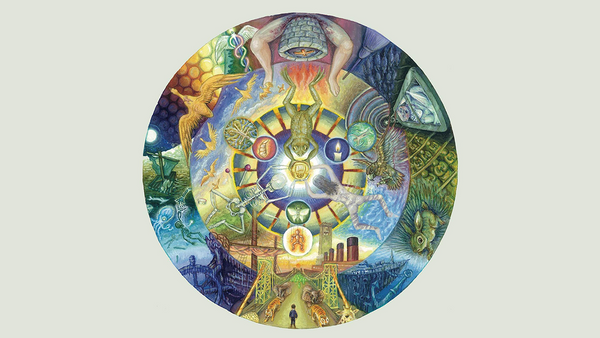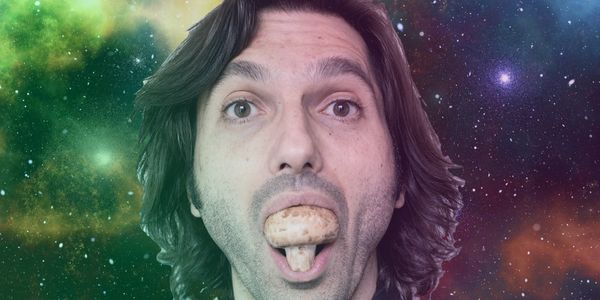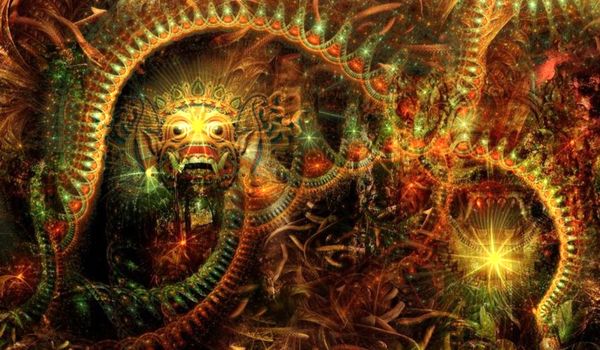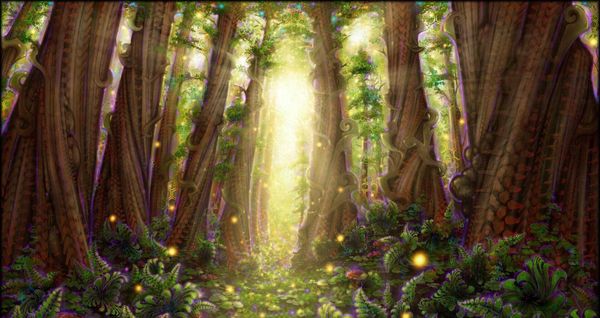ZARATHUSTRA SMITH • • 19 min read
5 Myths About Psychedelics That We Need to Stop Spreading

When you take psychedelics it’s easy to feel that you’ve found a “red pill” that has snapped you out of the matrix.
I know because I used to feel this way.
I thought psychedelics were this purely beautiful secret thing that had woken me up to a truer reality.
And in many ways I think I was right.
But that wasn’t the whole story…
It took me a number of years of reading, thinking, and experimenting with psychedelics before I admitted to myself a difficult truth:
Psychedelics have a dark side.
It’s not all blissful oneness and cosmic epiphanies.
On one hand I realized this early on after a couple of “bad trips.”
On the other hand, though, I was still subscribing to a number of dogmatic myths about psychedelics for years.
It was painful to realize that my treasured psychedelics weren’t all I had thought them to be.
But it was also very necessary to gain a more nuanced, realistic picture of psychedelics. This understanding allows me to advocate for psychedelics in a more reasonable, responsible way.
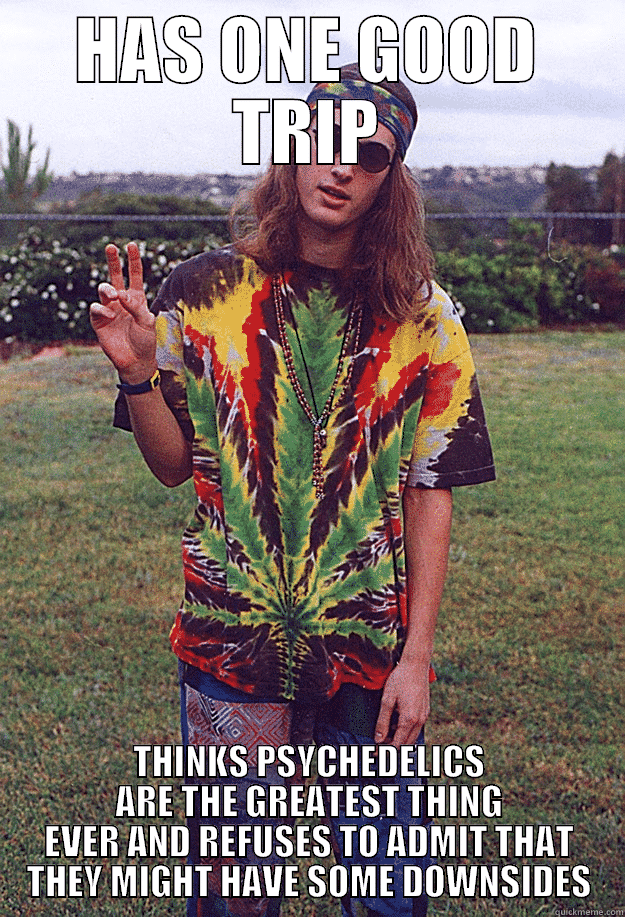
My Experience With Psychedelics
In case you’re thinking, “What does this guy know? Who is he to act like an expert on this subject?”, let me clarify a couple things.
At the time of writing this, I’ve taken psychedelics, primarily psilocybin mushrooms and LSD, upwards of 25 times in my life. I have a number of friends who have likewise experimented extensively with these substances. I’ve spent many hours researching scientific studies and trip reports related to psychedelics.
I don’t consider any belief so sacred as to be beyond scrutiny, so I have “taken a hammer” to my views on psychedelics over the years, to see if they withstand real critical analysis. To this day I think psychedelics have tremendous therapeutic and world-broadening potential, if people feel drawn to them and use them wisely, but over the years I have become much more cautious.
I have found that the culture surrounding psychedelics has some serious blindspots. This is to be expected, as any tribe of people who rally around something will generally become blind to its pitfalls and shortcomings. This is true of the global spiritual community, political tribes, and even the scientific community.
So the idea here is to share what I’ve learned through extensive research and personal experience, in hopes of illuminating some of the common blindspots of the global psychedelic culture.
5 Myths About Psychedelics to Stop Believing
In order to use psychedelics to their full potential both individually and collectively, we need to be brutally honest about what they are, and what they aren’t.
So now, it’s time to be real.
I’m going to go into detail to describe five specific myths that are commonly expressed in the psychedelic community.
Warning: Some of these may hit close to home.
The goal here is not to judge anyone for believing some version of these ideas, but to offer food for reflection, in hopes of helping humanity use powerful psychedelic tools in the most healthy and beneficial way. Let’s get into it.
Myth #1: Psychedelics show you the Divine Truth of Reality.
[Update: Since writing this I have delved deeper into spirituality and mysticism and have had experiences with Ayahuasca that changed my viewpoints a lot. I now deeply Intuit that psychedelics can indeed open up channels allowing one to connect directly to the frequency of Divine Truth. It’s tricky though, as the Divine will typically communicate with people in the symbolic language they will most deeply understand (i.e. their culture’s/religion’s symbolism), and thus many who connect to Truth have historically misinterpreted the message as implying that their particular culture or religion has a monopoly on Truth, or is the “one true path to Truth.” Rather, I have come to see that all great symbolic religious traditions, in their Essence, are akin to fingers pointing at the same Unsayable Divine Moon. The map can never be the Territory; words cannot be Truth; Truth can be realized, not spoken. Not realizing this, many humans have murdered others who had different maps, not realizing that all the great maps are pointing at the same Divine Thing, the Only Thing in existence, the One Divine Mystery of All That Is.]
Psychedelics can bestow a distinct feeling of having woken up from the matrix and tasted the Truth of Reality.
Many people who have taken psychedelics are convinced that they more or less mainlined the Secret Truths of the Universe.
There are a lot of reasons to think that this is not the case.
In defense of those who believe psychedelics have shown them Divine Truth, I will say that I certainly have had a lot of insights on psychedelics that have stood the test of time and proven to be of crucial importance to the person I have become. I also think psychedelics helped to diminish my capacity to be dogmatic and overly tribal, which I see as a huge boon.
I’ve also had mystical experiences on psychedelics—i.e. experiences in which the normal divisions between my being and that of the rest of the universe seemed to dissolve, as well as experiences of profound universal love and empathy for all sentient beings—that I suspect allowed me to experience the fundamental interconnectedness and inseparability of everything that exists. These experiences were supremely impactful for me as well.
With that being said, I’ve also had many realizations on psychedelics that later proved to be quite simplistic, romanticized, impractical, or downright misguided. I’ve read and heard many similar reports from others. Psychedelics can make almost any idea feel like a life-changing epiphany, but these ideas need to be scrutinized post-trip to separate the gemstones from the fool’s gold.
Another reason to be highly skeptical of people who claim to have learned some Ultimate Truth via psychedelics is this: historically, mystics in virtually every culture and time period have interpreted mystical experiences as evidence of the Truth of their particular religion or mythology.
That is, Christian mystics have interpreted mystical experiences as communion with Jesus Christ and the One True God. Muslim mystics have interpreted mystical experiences as proof of Allah’s existence. Hindu mystics have interpreted mystical experiences as interactions with Krishna. Modern New Agers interpret mystical experiences as an experience of Divine Oneness or the Great Goddess. And so on and so forth.
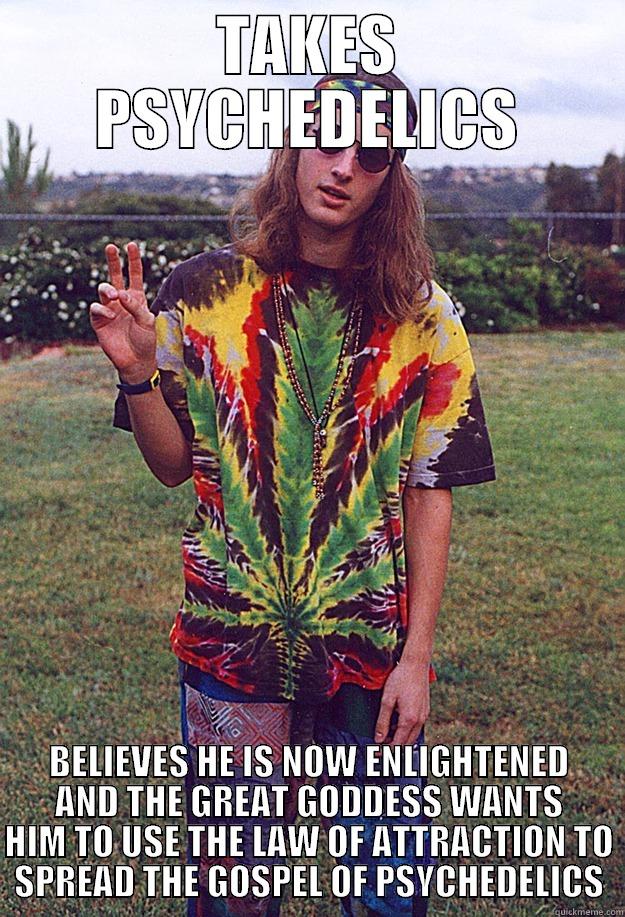
Humans tend to have some preexisting mythological framework that they use to conceptualize and categorize mystical experiences. These frameworks tend to distort mystical experiences by imbuing them with all sorts of culturally specific ideas and significances.
Most people who claim to have gained knowledge of Ultimate Truth via psychedelics have in fact had a mystical experience, and the Truth they believe they’ve gained consists of preexisting culturally specific concepts in their minds that they attached to the experience post hoc. This phenomenon is arguably a bad thing, because mystics across the ages have convinced themselves and those around them that their particular culture or religion has the Absolute Truth, and when humans think they’ve found the Absolute Truth, they often decide to kill other humans who disagree with them.
As I said, I’ve had mystical experiences and do not dispute that these extraordinary experiences do, in fact, occur. They are real and exceptionally powerful. What I dispute is the idea that these experiences confer access to the Absolute Truth of All Things. If anything, they do leave a strong impression that everything is deeply interconnected and that no single thing can be separated from everything else. But this is also kind of Ecology 101, not exactly an Impenetrable Secret of the Cosmos, though experiencing this truth firsthand is genuinely life-altering.
For a sober, scientific, agnostic discussion of mystical experiences stripped of cultural and mythological baggage, I highly, highly recommend listening to this interview with Vinay Gupta (Part I // Part II // Part III).
Myth #2: Psychedelics always give you exactly what you need at the time.
[Update: Since writing this I have delved deeper into spirituality and mysticism and now deeply Intuit that Life actually always gives us exactly what we need in every moment. All is Divine; All is One. So, in my view, in the deepest sense all psychedelic experiences (and everything else) do indeed happen for a Divine reason. At the same time, from the perspective of duality and relative truth, it’s useful to be aware of the less glamorous side of psychedelics.]
This is one of the most pervasive myths circulating in the psychedelic community.
A lot of people believe that whether you have a good trip or a bad trip, you “got just what you needed.” The idea is that psychedelic drugs have some kind of innate wisdom that allows them to reveal to you just what you need to know at your current stage of life.
In my experience there is some truth in this, but it’s far too simplistic. Psychedelics do seem to have a peculiar quality of giving people experiences that prove beneficial, even if those experiences are unpleasant at the time.
However, this is certainly not always the case.
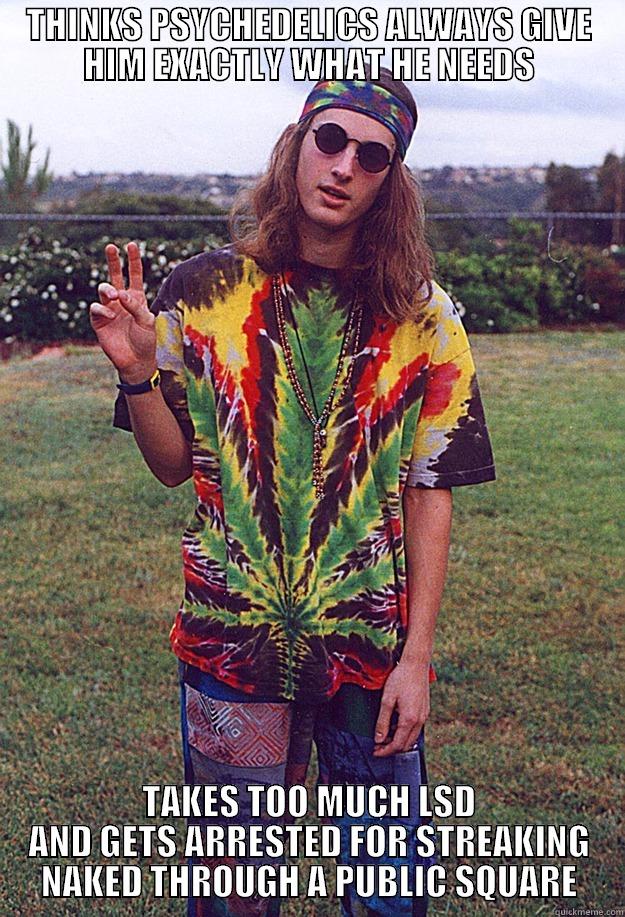
Magic mushrooms used to be legal in Amsterdam, until a tourist took some and jumped off a building while tripping. Was suicide exactly what she needed at the time?
In other cases, LSD, mushrooms, and other psychedelics trigger psychotic breaks, causing people to experience a wide range of symptoms, including things like intense paranoia, major depression, and an inability to distinguish fantasy from reality. Admittedly cases of psychosis represent a tiny fraction of psychedelic experiences (for more on the relative safety of LSD and mushrooms, read this article), but these cases cannot simply be discarded from consideration.
I myself once took mushrooms at a time I really should not have, and I had a particularly bad trip. Now, I ultimately ended up learning a lot from this trip over time, but it also seemed to permanently result in the barrier between my conscious and unconscious mind becoming much more permeable. Thus, in the years since, I’ve dealt with far more intrusive thoughts than I ever had previously, many of which are quite dark and troubling. For a long time this caused horrible anxiety and obsessive thinking. I suspect that if I’d never done psychedelics, much of this thought content would have remained unconscious. Would I take it back? Maybe that one trip, but I’m not sure, as learning to cope with this internal darkness has, I think, made me more resilient, better at living in my head, and better equipped to accept misfortune. This experience was also a catalyst for understanding a life-changing truth: thoughts aren’t such a big deal.
I’ve also personally known multiple friends who have had bad mushroom trips and couldn’t discern any positive lessons from the experience. One friend cowered under his covers for hours, certain of demonic presences all around him and of his impending death. Another friend stripped naked and acted erratically and has no recollection of what he was thinking.
Examples such as these seem to debunk the romantic notion that psychedelics always give people exactly what they need. For some people some of the time, psychedelics are just a fucking awful idea.[1]
Myth #3: Everyone should try psychedelics.
This one is closely related to the previous point. It’s widely believed in the psychedelic community that everyone should try psychedelics at least once, and that those who haven’t tried them are missing out on something fundamental. The American philosopher and psychedelic entertainer Terence McKenna (whom I love dearly) once said:
“I think of going to the grave without having a psychedelic experience like going to the grave without ever having sex. It means that you never figured out what it is all about. The mystery is in the body and the way the body works itself into nature.”
Ironically, McKenna himself had a horrifying psilocybin mushroom trip in the late ’80s. After this trip, for the last 12 years of his life, Terence took psychedelics only on rare occasions. In the original manuscript of his book, Brotherhood of the Screaming Abyss, Terence’s brother Dennis described the trip that caused Terence to take a permanent step back from psychedelics:
“… for some reason, the mushroom turned on him. The gentle, wise, humorous mushroom spirit that he had come to know and trust as an ally and teacher ripped back the facade to reveal an abyss of utter existential despair. Terence kept saying, so Kat told me, that it was, ‘a lack of all meaning, a lack of all meaning.’ And this induced panic in Terence and probably, I speculate, a feeling that he was going mad. He couldn’t deal with it. Kat’s efforts to reassure him were fruitless.”
I personally wish everyone could try psychedelics at least once, and I freely acknowledge that some of the most profound and transformative experiences of my life involved psychedelics.
However, I also acknowledge that some people simply aren’t built in such a way as to respond favorably to psychedelics, as my examples in my discussion of point #2 indicate.
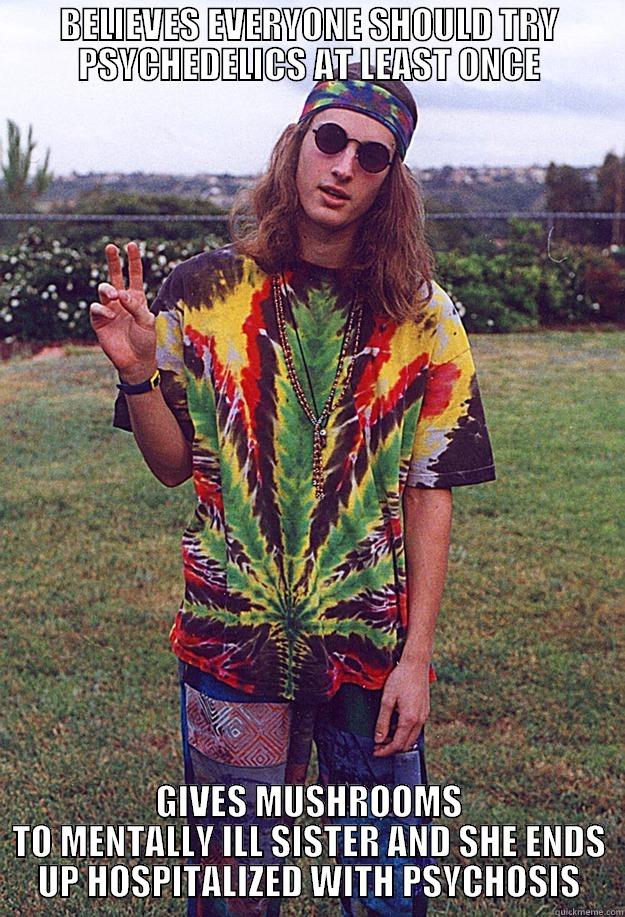
Some people, especially extremely volatile or mentally ill people (or those with a family history of mental illness), should almost certainly avoid psychedelics altogether. In my opinion extremely sensitive people or those prone to even mild anxiety or depression should also be quite cautious upon first dabbling with psychedelics, if they wish to.
It is also true that psychedelics often allow one to access content in one’s mind that was previously unconscious. For some people who have repressed many memories or parts of their identity, this can be an utterly overwhelming and traumatizing experience.
For this reason I think it’s a good idea to practice meditation, do a bunch of writing about your past, present, and future, and perhaps see a psychotherapist for a few sessions before trying psychedelics. These activities can help you uncover unconscious content in your mind at a much more digestible pace, making it less likely that a psychedelic trip will be too much to handle.
It’s also, of course, always wise to research a particular substance extensively before experimenting with it, if you feel compelled to.
Myth #4: People who haven’t taken psychedelics are ignorant “sheeple.”
This is an insidious myth within the psychedelic community and the larger global “spiritual” community.
If you haven’t taken psychedelics, or if you lead a rather “normal” (read: well-adjusted) life involving a 9-to-5 job, a mortgage, and cable television, you’re likely to be viewed as a “sheep”—i.e. one who unquestioningly conforms to the status quo—by a large segment of those who consider themselves to be #woke.
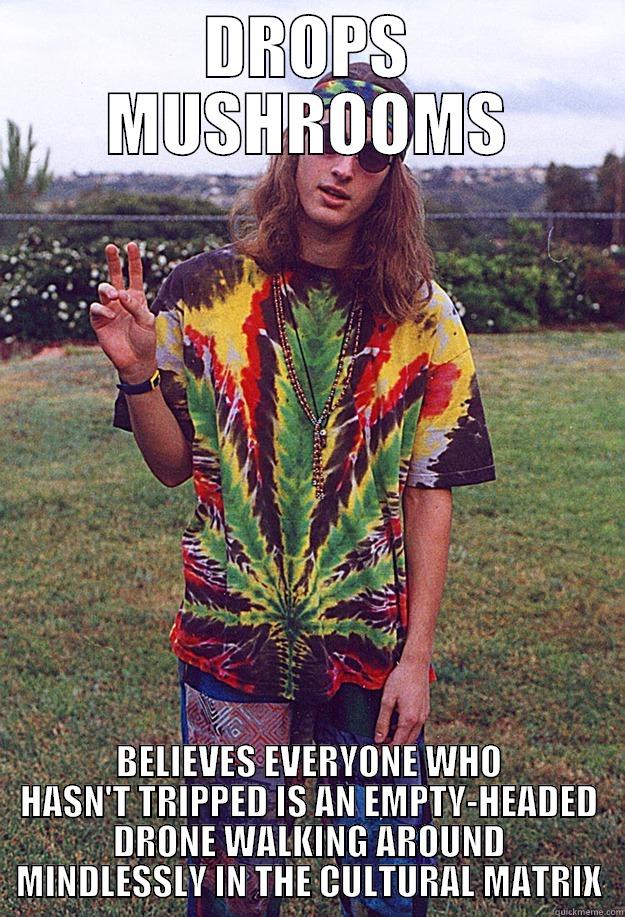
This is a classic example of the human tendency toward tribalism. We are deeply, evolutionarily wired to divide into groups and to celebrate our own group. This is generally a good thing, as it gives us tight-knit communities. But when tribalism gets ratcheted up a few notches, we become hostile toward other groups. A few more notches and we start killing people who aren’t members of our tribe.
While I’m not concerned about the psychedelic community initiating a war against “sheeple,” I do feel that there’s a lot of unnecessary belittlement and hypocritical self-aggrandizement going on that really ought to stop.
For one, this dichotomy of #woke vs “sheeple” is usually an illusion based on arbitrary judgments about what makes people wise, insightful, and intelligent. A number of the wisest and most intelligent people I know have never tried psychedelics. Many of my intellectual and spiritual heroes have jobs and mortgages and lead lives that appear, from the outside, to be conventional. I’ve also seen plenty of people who’ve tried psychedelics and/or consider themselves #woke who espouse the wackiest of ideas and engage in massive self-deception. The moral of the story is that there are many paths to wisdom and insight apart from psychedelics, and external appearances are not a reliable indicator of what’s going on in someone’s mind.
Furthermore, I suspect most people who view others as “sheeple” haven’t spent much time studying modern psychology. The Big Five model of personality is generally regarded as our most sophisticated and useful model of human personalities at this time. Because of the predictive success of the Big Five model, we know that one of the major traits in human personalities is a trait psychologists call “Openness.”
People who are high in trait Openness tend to enjoy novelty and to seek out new and unconventional experiences. Those low in trait Openness are more conservative, preferring stability and consistency. I strongly suspect that a lot of people who try psychedelics are simply high in trait Openness, while those who don’t try psychedelics and live more conventional lives are low in trait Openness.
Many “psychonauts” look down on those who live more conventionally and tell themselves that these people are too afraid and ignorant to chase their dreams and live more exciting, exploratory lives. In reality, those low in trait Openness don’t actually want psychedelic roller coasters and exotic experiences. Their dream is to get a good job, get married, have kids, buy a house, and find a stable, reliable happiness.
And guess what? There is absolutely nothing wrong with that. What do you think would happen to civilization if everyone wanted to be a psychedelic journeyman? Who do you think grows the food, transports the resources, keeps the plumbing functional, keeps the lights on, paves the roads, purifies the water, builds the structures you sleep in, and generally keeps our elaborate technological global infrastructure up and running? Stable, hard-working people who want consistency, for the most part. And make no mistake: without our global infrastructure, we wouldn’t have a prayer of providing for the 7 billion humans on this planet in the way that we are currently (though we still have much work to do to really meet everyone’s needs).
Ultimately, civilization needs both types of people: stable, reliable people to keep the existing infrastructure up and running, and open, exploratory people to create, innovate, and test ideas to find better ways of doing things. This Yin-and-Yang-esque relationship between those who preserve what has already been built and those who press forward into new territory has served humanity well for millennia. To disrespect the preservers of civilization by calling them “sheeple” is thus outrageously short-sighted, in this writer’s opinion.
Myth #5: Psychedelics can safely be used casually or as party drugs.
To the credit of the psychedelic community, I’ve seen many people speak out against this myth.
It’s pretty widely acknowledged now that “set and setting”—i.e. your mindset going into a trip and the environment in which you trip—are of paramount importance when using psychedelics. For reference, ideally you will have been in a calm, positive frame of mind for multiple weeks in a row before tripping and will trip in a safe, uplifting setting with people who love you unconditionally, one of whom acts as a sober “trip-sitter.” You should also trip when you have no obligations all day or the next day. And if you’re new to psychedelics, it’s wise to start with a small dose.
Despite the fact that the wisdom of “set and setting” is now fairly widespread, there are still countless people who don’t fully appreciate the vital importance of this message.
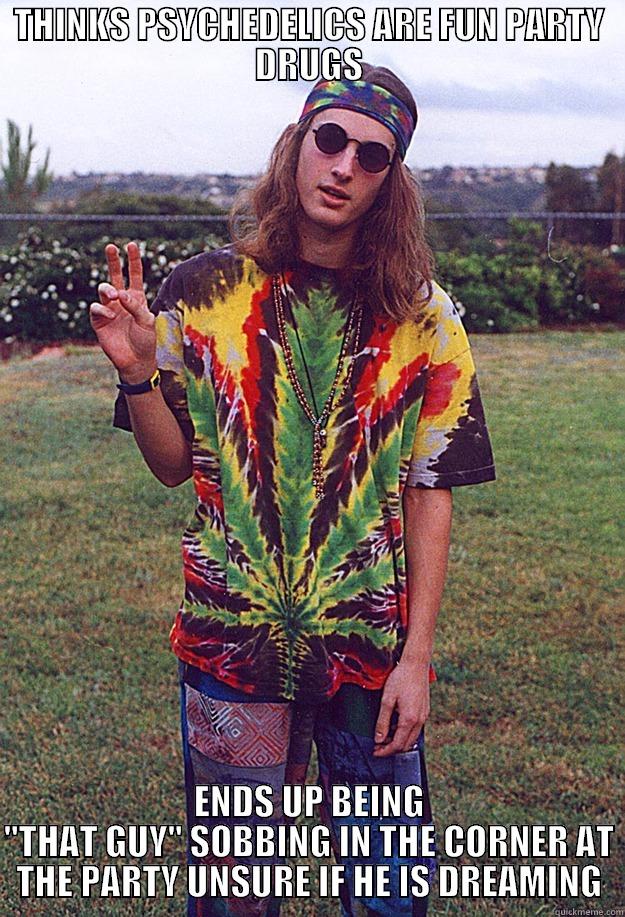
Each year, hordes of people take psychedelics in bad frames of mind, at inconvenient times, in inappropriate settings, or at parties, and each year, many of these people have horrible experiences and regret their decisions.
That’s not to say that people can’t ever enjoy psychedelics casually or festively. With an appropriate (micro)dose, in the right set and setting, it’s certainly doable, but the point is that this is really easy to fuck up. And trust me: you don’t want to be the guy tripping balls in a totally dissonant context.
Psychedelics are not, by and large, casual party drugs. They are unspeakably powerful tools that can completely shift the way you perceive reality and show you sides of yourself you never knew. They are not to be taken lightly. They must be treated with reverence and caution.
For one of the greatest artistic illustrations of this point (and other points in this article), listen to the song ‘Mushrooms’ by Eminem.
(If you’re interested in experiencing psychedelics in a safe setting expertly optimized for a positive and profound experience, consider attending one of our Apotheosis retreats.)
Bonus: Psychedelics are going to save the world.
A lot of people have an almost religious faith in the idea that psychedelics are the key to “waking up” humanity and saving the world. Born during the LSD-fueled hippie movement of the 1960s, the idea is that we just need to get a huge number of humans to experiment with psychedelics, and we’ll reach a kind of critical mass necessary for collective enlightenment.
Now, I am someone who thinks psychedelics have a lot of potential to make the world a better place. Nonetheless, I think this prophecy of a mass awakening via psychedelics is more or less hopelessly doomed.
For one, we need to be honest about the fact that psychedelics do not reliably transform people into enlightened warriors for the Earth, or whatever. I know a lot of people who have taken psychedelics, had a positive experience, and yet remained approximately the same person they were before the trip. Psychedelics are not a magic pill for transforming Joe Briefcase into the Dalai Lama.
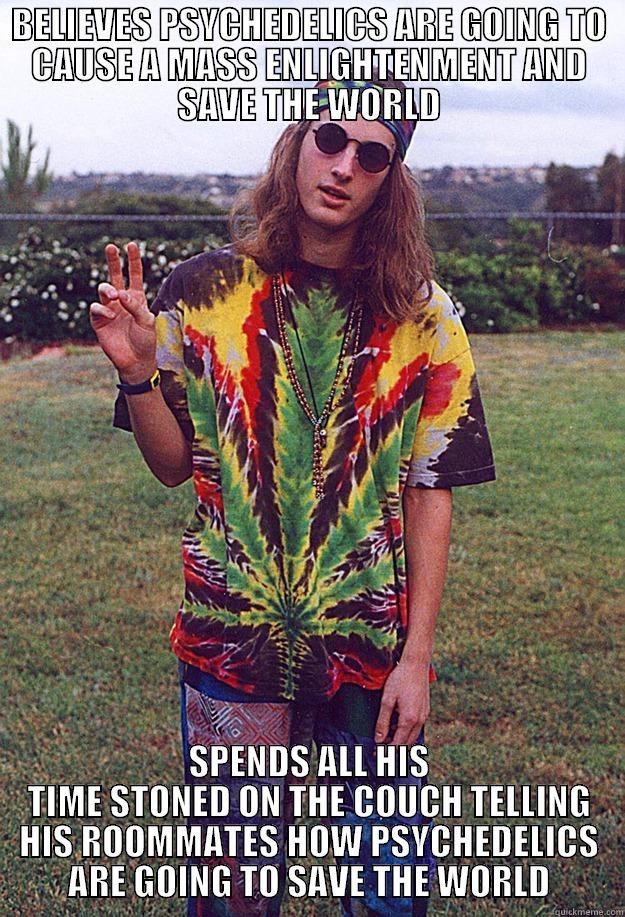
For two, most all psychedelics remain illegal in the vast majority of countries on Earth, and in a lot of places, the penalties for breaking these laws are staggeringly inhumane. This situation massively disincentivizes the use of psychedelics globally, and the majority of people living today will likely die without ever having a psychedelic experience.
I hope these laws are reformulated in a more sane direction as rapidly as possible, but if history is any indication, drug laws tend to change at a tortoise pace, so don’t hold your breath. Given the pressing nature of many global issues, I think we need to use all tools at our disposal, rather than wait patiently for the psychedelic revolution.
In this spectacular interview (Part I // Part II), Vinay Gupta made the following comment regarding a mass awakening:
“There’s a… traditional New Age certainty that there’s a kind of species-level awakening coming and all the rest of this sort of stuff. You know, the sort of Terence McKenna vibe, and I’m sure you’ve heard that until you’re just purple in the ears. I don’t think it’s that, and I don’t think it’s Marxist historical inevitability or any of that stuff. What I think is coming is a species-level panic response: ‘Oh my God, we’re all going to die. We have to work together to avoid all dying.’ There’s a book called A Paradise Built in Hell about spontaneous cooperation after large-scale natural disasters. And I think that there’s a pretty good chance that we’re going to experience a moment like that in response to the manmade disasters that we’re currently beginning to live in.”
This statement approximates my own sentiments on this topic. I think Vinay is right that people don’t generally start caring deeply about a global issue until it’s affecting them directly. This is unfortunate, as it’s entirely possible that by the time various global issues are affecting the majority of people on Earth, it will be too late to avoid catastrophe.
I’m not as convinced as Vinay, however, that we’re going to reach a “species-level panic response” any time soon. Yes, there are currently a number of extremely pressing issues facing humanity, some of which have the potential to cause the extinction of our species. However, there are also already many smart people working very hard to address these issues. In a lot of ways it’s a race between entropy and human ingenuity, and it isn’t clear to me that we’re losing.
Nonetheless, I still believe the average person should care about helping humanity avert catastrophe. I think anyone can help with this project by striving to live more compassionately, sustainably, self-reliantly, and non-dogmatically.
Ultimately, my takeaway on this topic is this: Psychedelics will not save us. Only we can save ourselves.
Would I Recommend Psychedelics to Someone?
In light of everything I discussed in this article, if an individual (like you, dear reader) approached me and asked if I recommended psychedelics, what would I say?
That’s a difficult question. I think my answer at this point would be something along the lines of:
“I’m agnostic as to whether or not you specifically should take psychedelics in your lifetime. My advice is to do a lot of reading and research about these compounds and the laws in your area, and decide for yourself what to do. I don’t personally regret experimenting with psychedelics, but it’s important to be aware of the risks involved, to make an informed decision, and to have a clear idea of why you want to venture into this territory. Ingesting these (illicit) substances is not something to take lightly. If you end up deciding you want to take the leap, wait until you’re at least in your early-to-mid 20s, do plenty of research, start with a small dose of LSD or psilocybin mushrooms that you’re certain are legit, and be intelligent about it, always respecting the wisdom of set and setting.”
I’m generally in favor of people worldwide continuing to experiment responsibly with psychedelics, but I’m hesitant to recommend them to specific individuals. This is how I feel about most somewhat-risky-yet-rewarding endeavors—like jungle-trekking or sky-diving. I generally support people worldwide who want to trek through jungles and jump out of airplanes, but if a specific person asked me if they should pursue these pastimes, I’d tell them I couldn’t be sure either way—that they should be prudent and decide for themselves.
With that being said, I’m highly enthusiastic about the promising scientific research being done in the area of psychedelic therapy. I think there’s massive potential there.
And as I’ve said, I think psychedelics are world-broadening tools with immense power to catalyze life-changing mystical experiences and to show you “another side to the coin,” as Steve Jobs put it. To close the lid on humanity’s utilization of these tools would be a tragic loss of potential, I feel.
Using Psychedelics to Improve the World
In order to maximize the positive impact that psychedelics can have in our world, I think we need to be uncommonly honest with ourselves.
When used responsibly, psychedelics can be profoundly useful and transformative for individuals. Scientific studies and anecdotes suggest that they can occasion life-changing mystical and religious experiences and be used to treat depression, death anxiety, and addiction.
And a mountain of anecdotal evidence suggests that psychedelics generally increase compassion, ecological consciousness, tolerance, curiosity, and creativity—qualities which humanity arguably needs in abundance as we progress forward into the 21st century.
But in order to make psychedelics a viable clinical treatment and a more effective and accepted tool for personal and civilizational transformation, we need to be honest about a few things:
1. Psychedelics probably don’t give you access to the Absolute Truth of the Universe.
2. Sometimes psychedelics don’t give people exactly what they need.
3. Some people really shouldn’t take psychedelics; it is eminently wise to research any substance extensively before experimenting, if you feel compelled to do so.
4. There’s no reason to look down on those who haven’t used psychedelics.
5. The “set and setting” of a psychedelic trip are vital for creating a positive experience.
6. Psychedelics will not save the world; only we can save ourselves.
If we admit to ourselves what psychedelics are and what they are not, we’ll be much better equipped to utilize them in a productive way.
I think psychedelics have a role to play in helping us create a more beautiful future for ourselves and our planet.
Let’s not stifle their potential by perpetuating myths about them.
Footnotes:
[1] Another inherent problem with psychedelics is that many of them are illegal in most of the world. Their illicit status means that it can be difficult to know for sure that you’ve gotten the “real thing” if you obtain them. Thus, if you’re compelled to dabble, it’s highly advisable to acquire psychedelics from trusted sources and to buy a test kit for good measure.
If you’d like to experience psychedelics in a safe setting expertly optimized for a positive and profound experience, join us at Apotheosis.
If you loved this article, you’ll probably also love these:
Psilocybin and the Shadow: Magic Mushrooms as a Tool For Healing Emotional Trauma
The Trip Treatment (New Yorker article on promising psychedelic research)
10 “Spiritual” Things People Do That Are Total Bullshit
Microdosing: The Revolutionary Way of Using Psychedelics
Dear Mom and Dad: I Cured My Depression, But You Might Not Like How I Did It

